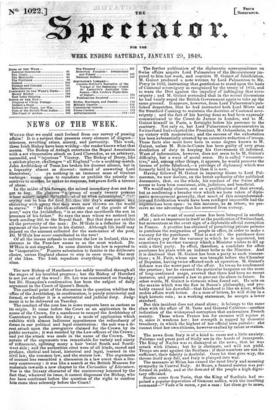M. Guizot's want of moral sense has been'betrayed in another
affair ; not so important in itself as the pacification of Switzerland, but momentous as the overt sign of a deplorable official corruption in France. A practice has obtained of permitting private persons to purchase the resignation of people in office, in order to make a vacancy for the purchaser. That is not all : the purchaser does not always pay for the vacancy to which he is appointed, but sometimes far another vacancy which a Minister wishes to fill up with a third party. In effect, therefore, a candidate for office purchases his place with an indirect bribe to the Minister. And it is disclosed that M. Guizot has been a party to such transac- tions ; a M. Petit, whose case was brought before the Chamber of Deputies, having twice effected such an operation. M. Guizot's defence was the worst part of the affair. In terms he condemned the practice ; but he excused the particular bargains on the score of long-continued usa"e, averred that there had been no recent instance, and promised a law to prevent the abuse in future. In other words, M. Guizot is virtuous when found out. He acts on the maxim which was the flaw in Bacon's philosophy, and pro- bably caused his downfall—that falsehood is like an alloy, which makes affairs work better. As a man of letters, he will write in a high historic vein ; as a working statesman, he accepts a lower standard.
But this incident does not stand alone; it belongs to the same class with the affair of M. Teste and General Cubieres—another indication of the widespread corruption that undermines French society. Those whom France has for enemies will rejoice at it, since it weakens her : her strength is sapped by domestic treachery, in which the highest of her official men partake : she cannot trust her own citizens, however exalted by talent or station.






















